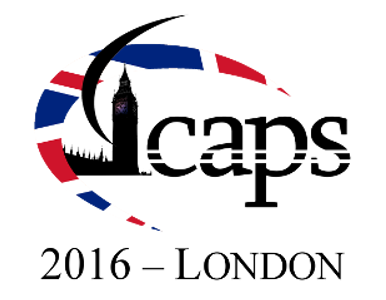UPDATE: To follow along on your mobile device, we have set up a Guidebook event for you to subscribe. Click [here] for information on the Guidebook application. The key phrase for the guide is icaps2016.
ICAPS is the premier forum for exchanging news and research results on the theory and applications of planning and scheduling technology. This year will feature a Main track as well as Demo, Robotics, and Novel Applications tracks, along with a host of workshops and tutorials. For students, both a Summer School and Doctoral Consortium will be held.
Key Dates
| Abstract submission | 18 Nov, 2015 |
| Paper submission | 22 Nov, 2015 |
| Author notification | 26 Jan, 2016 |
| Workshop submission | 4 Mar, 2016 |
| Camera ready papers due | 10 Mar, 2016 |
| Summer school | 8 – 11 Jun, 2016 |
| Doctoral consortium | 12 Jun, 2016 |
| Workshops & Tutorials | 13, 14 Jun, 2016 |
| Main conference sessions | 15 – 17 Jun, 2016 |
Venue
The conference (and pre-conference events, including the workshops and tutorials) will be held on the Strand campus of King's College London. King's is the heart of London on the banks of the Thames - the view from the campus is at the top of this page. It is within walking distance of many of the cultural highlights that make London an exciting conference location.
Summer School
A planning and scheduling summer school will take place prior to the ICAPS conference from June 8 to June 11. The location will be in London, and more details will be provided in the coming months.
Invited Talks (2016)
David Silver (Google DeepMind)
Mastering the Game of Go with Deep Neural Networks and Tree Search
Abstract: The game of Go has long been viewed as the most challenging of classic games for artificial intelligence owing to its enormous search space and the difficulty of evaluating board positions and moves. Here we introduce a new approach to computer Go that uses ‘value networks’ to evaluate board positions and ‘policy networks’ to select moves. These deep neural networks are trained by a novel combination of supervised learning from human expert games, and reinforcement learning from games of self-play. Using this search algorithm, our program AlphaGo achieved a 99.8% winning rate against other Go programs, and defeated the human European Go champion by 5 games to 0. This is the first time that a computer program has defeated a human professional player in the full-sized game of Go, a feat previously thought to be at least a decade away.
Susanne Biundo (Ulm University)
Making Plans for Human Users
Abstract: User-centered planning is a strand of the field that investigates a variety of AI planning functionalities that go beyond the mere generation of plans. It aims at the realization of comprehensive plan-based user support as the core functionality of advanced assistance systems. In this talk, we introduce a hybrid planning formalism designed for user-centered planning. It combines features of hierarchical task networks and partial-order causal-link planning in a well-defined manner, thereby reflecting and explicitly representing the causal and hierarchical reasoning planning is about. We discuss the theoretical properties of this formalism as well as implementation aspects and show how plan generation, plan explanation, plan repair, plan recognition, and mixed-initiative planning are realized within this integrative framework. Finally, we present two assistance systems where the combination of these planning capabilities implements the support of users in complex assembly tasks and in the compilation of individual fitness-training programs, respectively.
Stephen Smith (Carnegie Mellon University)
Real-time Planning for Real-Time Traffic Control
Abstract: Real-time traffic signal control presents a challenging multi-agent planning problem, particularly in urban environments where (unlike simpler arterial settings) there are competing dominant traffic flows that shift through the day. Urban environments also require attention to multi-modal traffic flows (vehicles, pedestrians, bicyclists, buses) that move at different speeds and with different priorities. For the past several years, my research group has been evolving an adaptive traffic signal control technology to address these challenges, referred to as Surtrac (Scalable Urban TRAffic Control). Surtrac combines principles from automated planning and scheduling, multi-agent systems, and traffic theory. It is designed to operate in a totally decentralized manner, where each individual intersection repeatedly solves a special type of single machine scheduling problem to generate signal timing plans in real-time that optimize movement of the sensed approaching traffic. These plans are then communicated to downstream neighbors to achieve coordinate behavior (e.g. green progressions). Surtrac has produced significant improvements in traffic flow efficiency and air quality in the field, and currently controls a network of 50 intersections in the East End area of Pittsburgh PA. Current research with Surtrac focuses on integration of adaptive signal control with emerging connected vehicle technology, and on the development and use of performance self-monitoring capabilities. Other, more basic research is investigating the potential of economically motivated approaches to adaptive signal control, which give agency and decision-making influence to individual drivers. This talk will provide an overview of this overall research effort.
News and Updates
- 19 Apr, 2016 - Schedule Released
- 17 Apr, 2016 - Tutorials Announced
- 3 Mar, 2016 - Invited talks and awards announced.
- 23 Feb, 2016 - Summer School Announced
- 8 Feb, 2016 - Demo Track Announced
- 31 Jan, 2016 - Accepted Papers Announced



